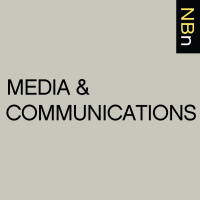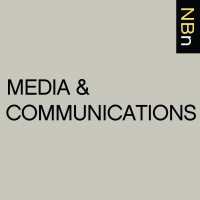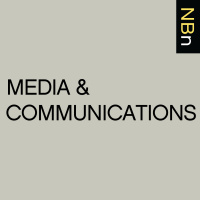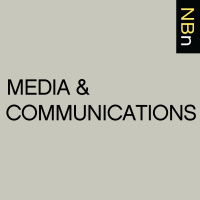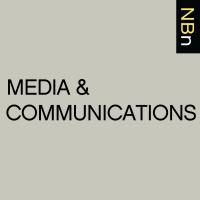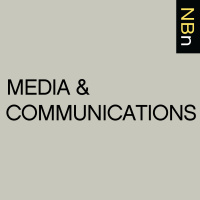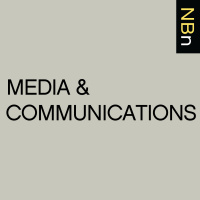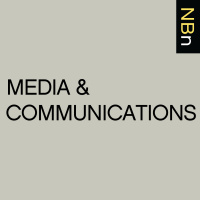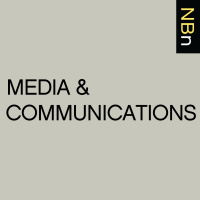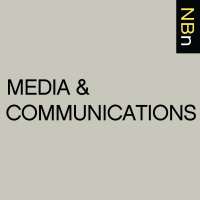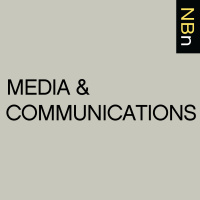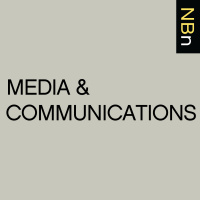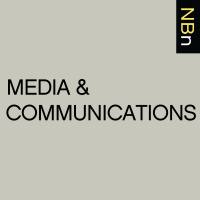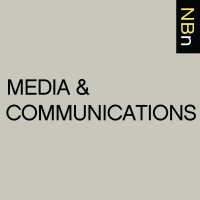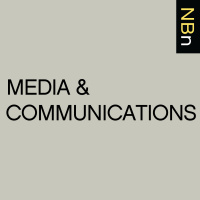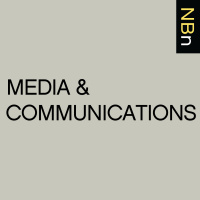Synopsis
Interviews with Scholars of Media and Communications about their New Books
Episodes
-
Alon Peled, “Traversing Digital Babel: Information, E-Government, and Exchange” (MIT Press, 2014)
07/11/2014 Duration: 44minFailure by government agencies to share information has had disastrous results globally. From the inability to prevent terrorist attacks, like the 9-11 attacks in New York City, Washington D.C., and Pennsylvania, to the ill-equipped and ill-fated responses to disasters like the nuclear meltdown at Fukushima, and Hurricane Katrina, a common denominator in all of these events, and those similar, was a lack of inter- and intra-government information sharing. In his new book Traversing Digital Babel: Information, E-Government, and Exchange (MIT 2014), Alon Peled, associate professor of political science at The Hebrew University of Jerusalem, conceptualizes a platform that would incentivize inter-agency information sharing. Called the Public Sector Information Exchange (PSIE), the platform would not only enable the trading of information, but also offers the valuation of information assets. In this way the PSIE creates an inter-government economic system. In detailing of the opportunities and threats to such a sys
-
Ethan Zuckerman, “Rewire: Digital Cosmopolitans in the Age of Connection” (Norton, 2013)
06/11/2014 Duration: 48minIn the early days of the Internet, optimists saw the future as highly connected, where voices from across the globe would mingle and learn from one another as never before. However, as Ethan Zuckerman argues in Rewire: Digital Cosmopolitans in the Age of Connection (Norton, 2013), just because a connection is possible does not mean disparate voices are being heard. Instead, things and not ideas have become more connected; we now live in a world where is easier to get a bottle of water from a tropical island halfway around the world than it is to get (let alone comprehend) news from that island. Zuckerman, a media scholar and activist based at MIT, suggests despite our perceived “connectedness,” the wired world is actually becoming more provincial and narrow, as we shift from professionally curated news and information, to search engines and algorithmically selected information based on previous “likes” and those of our homogeneous social circles. In other words, we are getting more and more of what we alread
-
Marisol Sandoval, “From Corporate to Social Media” (Routledge, 2014)
05/11/2014 Duration: 39minWhat would a truly ‘social’ social media look like? This is the core question of From Corporate to Social Media: Critical Perspectives on Corporate Social Responsibility in Media and Communication Industries (Routledge, 2014), the new book by Marisol Sandoval. The text is concerned with the emergence of a seemingly open and democratic space, social media, which is in fact subject to corporate dominance and control. The book aims to provide a political economy of the social relations in which media and communications industries are embedded, to reveal the inequalities of both power and control in social media. This point is illustrated through case studies of major corporations. Sandoval takes an important theme- including net neutrality, e-waste, ideologies, and labour conditions- and compares and contrasts CSR statements and positions with the reality of corporate actions on these themes. Case studies include Google, Apple, Disney and AT&T. The book concludes by considering how social media might become more
-
Hugh F. Cline, “Information Communication Technology and Social Transformation” (Routledge, 2014)
09/10/2014 Duration: 42minThere is no doubt that innovations in technology have had, and are having, a significant impact on society, changing the way we live, work, and play. But the changes that we are seeing are far from novel. In fact, most are a continuation of changes to society and societal structure with roots in the past. So argues Hugh F. Cline, adjunct professor of sociology and education at Teachers College, Columbia University, in his new book, Information Communication Technology and Social Transformation: A Social and Historical Perspective (Routledge, 2014). According to Cline, the technopanics, or strong objections to new technology have happened since the days of Aristotle. In spite of the objections, technological innovations can positively advance societal interests. Mixing history, sociology, anthropology, and technological studies, Cline provides context for the examination of how ICTs are impacting society. Learn more about your ad choices. Visit megaphone.fm/adchoices
-
Brooke Erin Duffy, "Remake, Remodel: Women's Magazines in the Digital Age" (U Illinois Press, 2013)
18/09/2014 Duration: 35minBrooke Erin Duffy's Remake, Remodel: Women's Magazines in the Digital Age (University of Illinois Press, 2013) traces the upheaval in the women's magazine industry in an era of media convergence and audience media-making. Duffy, assistant professor at Temple University's School of Media and Communication, is especially interested in the experience of writers, editors, and others who produce women's magazines: How are they coping with new competition, more intense work routines, and the imperative to produce (and engage) across a range of non-print media platforms? Questions of identity thread through the book: What does it mean to be a magazine writer in the iPad era? What are the stakes for gender identity as this female-focused genre adapts to digital workflows? To get at these questions, Duffy conducted in-depth interviews with dozens of editors, publishers, interns, and business-side workers, most of them at the big three magazine publishers, Hearst, Conde Nast, and Time, Inc. Remake, Remodel traces the h
-
Julia Azari, “People’s Message: The Changing Politics of the Presidential Mandate” (Cornell UP, 2014)
08/09/2014 Duration: 33minJulia Azari has written Delivering the People’s Message: The Changing Politics of the Presidential Mandate (Cornell University Press, 2014). Azari is assistant professor of political science at Marquette University. What was President Obama’s mandate when he was elected in 2008? Did that mandate extend to 2012? We commonly think that mandates attach to wide electoral margins. Azari cuts through this convention to analyze the variety of ways presidents have used the language of mandates to advocate for their policy agenda. Azari’s book fits with a book featured on the podcast in May by John Hudak. Both books link together the political and policy dimensions of the presidency. Azari discovers that presidents refer to mandates when political polarization increases and as the White House loses legitimacy. By the time President Obama was elected, these factors came together, thereby increasing the use of mandate language and the unrealistic expectations that often come with lofty promises. Learn more about your a
-
Jeremy Lipschultz, “Social Media Communication: Concepts, Practices, Data, Law, and Ethics” (Routledge, 2014)
07/09/2014 Duration: 45minSocial media is a phenomenon that continues to grow and attract much attention in the form of consternation, commentary, criticism and scholarly research. Any attempt at truly understanding social media communication practices and tools requires interdisciplinary analysis, the examination of the technology from the varying perspectives of the groups of users, developers and experts with respect to the issues surrounding it. It also should include a look at the changes social media has and continues to bring to various fields, particularly with respect to professional communication. Jeremy Lipschultz, Isaacson Professor in the School of Communication at the University of Nebraska at Omaha, discusses the impact of social media on various mass communications professions in his new book Social Media Communication: Concepts, Practices, Data, Law, and Ethics (Routledge 2014). In his book, Lipschultz examines the various theories and practices connected to social media communication, and how this emerging form of c
-
Joe Moran, “Armchair Nation: An Intimate History of Britain in Front of the TV” (Profile Books, 2013)
30/07/2014 Duration: 49minThe social and cultural historian Joe Moran, Professor of English and Cultural History at Liverpool John Moores University, UK is interested in the everyday moments between great events. In his books Queuing for Beginners: The Story of Daily Life from Breakfast to Bedtime, On Roads: A Hidden History and now Armchair Nation: An Intimate History of Britain in Front of the TV (Profile Books, 2013) he documents the mundane activities that make up our lives. In Armchair Nation Moran surveys the history of television watching in Britain from the technology’s first demonstration in a department store in 1925 and up to today. Moran’s engaging narrative progresses through major milestones in the medium’s history. To document how watching television had become a daily habit for a multitude of individuals, Moran uses an assortment of sources such as newspaper reviews, listings and interviews, diaries, and Mass Observation entries. While Moran hesitates to treat the consumption of television as an act of community build
-
Judith Donath, “The Social Machine: Designs for Living Online” (MIT Press, 2014)
19/07/2014 Duration: 31minThe conversation about the Web and social media skews toward a discussion of the potential for connections, and how both individuals and organizations are using the media to communicate, to form communities, and to conduct business. Lacking, for the most part, is an investigation of the design of these spaces and how design, both good and bad, encourages or provokes certain kinds of interactions. In her new book, The Social Machine: Designs for Living Online (MIT Press, 2014), Judith Donath, Faculty Fellow at Harvard University’s Berkman Center, explores the theory and practice of interface design, and analyzes how design influences online interaction. With a view toward inspiring designers, and others, “to be more radical and thoughtful in their creations,” Donath provides a detailed examination of topics to be considered for beneficial design. Learn more about your ad choices. Visit megaphone.fm/adchoices
-
Lisa Gitelman, “Paper Knowledge: Toward a Media History of Documents” (Duke UP, 2014)
09/07/2014 Duration: 01h06min“One doesn’t so much read a death certificate, it would seem, as perform calisthenics on one…” From the first, prefatory page of Lisa Gitelman‘s new book, the reader is introduced to a way of thinking about documents as tools for creating bodily experience, and as material objects situated within hierarchies and relationships of labor. Working beautifully at the intersection of media studies and history, Paper Knowledge: Toward a Media History of Documents (Duke University Press, 2014) curates a thoughtful and inspiring collection of moments from the expansion of a modern “scriptural economy.” The case studies explore fill-in-the-blank forms in the context of late nineteenth century job printing, typescript books and scholarly communication in the 1930s, photocopies and photocopying in the 1960s and 1970s, and PDF files in the 1990s and beyond. The final chapter is a fascinating exploration of what it might look like to write a situated history of amateurdom and the figure of the “amateur,” a theme that re
-
Payal Arora, “The Leisure Commons: A Spatial History of Web 2.0” (Routledge, 2014)
02/07/2014 Duration: 33minScholars and commentators have used metaphor in an attempt to describe the Web since public access began. Think of ideas like the information highway, cyberspace, the digital library, etc. In her new book, The Leisure Commons: A Spatial History of Web 2.0 (Routledge, 2014), Payal Arora, an assistant professor in the Department of Media and Communication at Erasmus University Rotterdam, takes a novel approach to the use of metaphor by examining the parallels between public common spaces and Web 2.0. In the book, Arora uses an interdisciplinary approach to exploring the historical, geographical, political and social issues related to public parks. In so doing, Arora, provides a foundation for how policymakers, organizations and individuals may conceptualizes the debates surrounding common spaces, particularly Web 2.0. Learn more about your ad choices. Visit megaphone.fm/adchoices
-
Ian Haney Lopez, “Dog Whistle Politics: How Coded Racial Appeals Have Reinvented Racism and Wrecked the Middle Class” (Oxford UP, 2014)
30/06/2014 Duration: 23minIan Haney Lopez is the author of Dog Whistle Politics: How Coded Racial Appeals Have Reinvented Racism and Wrecked the Middle Class (Oxford UP 2014). He is the John H. Boalt Professor of Law at the University of California, Berkeley, and on the Executive Committee of the Thelton E. Henderson Center for Social Justice. Lopez investigates the often hidden side of racism. He traces the political history of candidates for office using a set of coded phrases, allusions, and references to call attention to race, without ever uttering the word. In the post Brown v. Board era, Lopez argues, candidates learned a new language of strategic racism, substituting anti-government rhetoric for anti-black, anti-Latino, or anti-immigrant. In doing so, the dog whistle was heard as a much wider criticism of the social welfare state, and thus a direct attack not just on minorities, but on the middle class. Learn more about your ad choices. Visit megaphone.fm/adchoices
-
Patrick Burkart, “Pirate Politics: The New Information Policy Contests” (MIT Press, 2014)
26/06/2014 Duration: 42minThe mid-’00s saw the rise of a political movement in Europe concerned with technocratic impositions on the ideals of free culture, privacy, government transparency and other technology policy issues. Led by online file sharers and developers, the Swedish Pirate Party was thrust into the spotlight in 2006 after law enforcement shut down the popular file sharing site The Pirate Bay. In his new book, Pirate Politics: The New Information Policy Contests (MIT Press, 2014), Patrick Burkart, an associate professor of communication at Texas A&M University and currently a visiting scholar at the University of Helsinki, examines the rise of the Pirate Party in Sweden, and later Germany. To do so, Burkart analyzes ideas about the colonization of Internet communities and resources using critical communications theories. In do doing, Burkart provides a foundation for the examination of the spread of Pirate parties across the globe as well as the rise of similarly aligned political movements. Learn more about your ad choic
-
John Nathan Anderson, “Radio’s Digital Dilemma: Broadcasting in the 21st Century” (Routledge, 2014)
20/06/2014 Duration: 52minJohn Nathan Anderson’s new book, Radio’s Digital Dilemma: Broadcasting in the 21st Century (Routledge, 2014), documents the somewhat tortured path of broadcast radio’s digital transition in the United States. Beginning his analysis with rise of neoliberal communications policy in the 1980s, Anderson charts the development of the idea of digitalization by closely examining two key archival sources: The Federal Communication Commission’s extensive archive of rulemaking and public comments and the archives of the two most important trade journals in broadcast radio, Radio World and Current. As Anderson explores in the book, FCC regulatory neglect coupled with the huge consolidation within the radio industry following the passage of the Telecommunications Act of 1996 resulted in a digital transition that was dictated largely by commercial interests. For example, the most important decision about digital radio – the engineering standard for digital broadcasting – was determined by a federation of corporations t
-
David Hesmondhalgh, “Why Music Matters” (Wiley Blackwell, 2014)
19/06/2014 Duration: 40minWhat is the value of music and why does it matter? These are the core questions in David Hesmondhalgh‘s new book Why Music Matters (Wiley Blackwell, 2014). The book attempts a critical defence of music in the face of both uncritical populist post-modernism and more economistic neo-liberal understandings of music’s worth. Hesmondhalgh develops this critical defence of music by exploring its importance to individuals, to places, to communities and to nations, eventually engaging with the global aspects of music’s role and position in society. The book seeks to argue against some common positions in music, reasserting the importance of embodied experiences, such as dancing, whilst taking issue with the idea of the rock star as hero. Moreover Hesmondhalgh shows the social position and social structures surrounding music, whilst remaining attentive to the aesthetic qualities of both genres and individual pieces of music. Most notably the book is ambivalent about much of the promises claimed by the advocates of
-
Leilani Nishime, “Undercover Asian: Multiracial Asian Americans in Visual Culture” (University of Illinois Press, 2014)
16/06/2014 Duration: 58minLeilani Nishime‘s Undercover Asian: Multiracial Asian Americans in Visual Culture (University of Illinois Press, 2014) challenges the dominant U.S. cultural narrative that imagines multiracial people as symbols of a future United States where race has ceased to function as a viable category. Nishime considers how representations of mixed race people often negate the significance of race by seeing racial mixture as an unprecedented social development that can promise a future free of race. By reading an archive of visual pop-culture that includes the celebrity of Tiger Woods, the film series “The Matrix” and reality television, Nishime considers how various narratives of multiracial Asian Americans can rupture naturalized notions of racial difference. Learn more about your ad choices. Visit megaphone.fm/adchoices
-
danah boyd, “It’s Complicated: The Social Lives of Networked Teens” (Yale UP, 2014)
12/05/2014 Duration: 45minSocial media is ubiquitous, and teens are ubiquitous on social media. And this youth attachment to social media is a cause for concern among parents, educators, and legislators concerned with issues of privacy, harm prevention, and and cyberbullying. In her new book, It’s Complicated: The Social Lives of Networked Teens (Yale UP, 2014), danah boyd, a Principal Researcher at Microsoft Research, Research Assistant Professor at NYU, and Fellow at Harvard University’s Berkman Center, demystifies teen use of social media for communication. In particular, boyd uses ethnographic interviewing and observation techniques to examine the how, what and why of youth use of sites like Facebook, Twitter, and MySpace. Learn more about your ad choices. Visit megaphone.fm/adchoices
-
Jennifer Stromer-Galley, “Presidential Campaigning in the Internet Age” (Oxford UP, 2014)
05/05/2014 Duration: 26minThe Oxford University Press series on digital politics has produced several new books that we have featured on the podcast. Interviews with Dave Karpf, Dan Kreiss, and Muzammil Hussain are available in previous podcasts. One of the latest from the series is Jennifer Stromer-Galley new book Presidential Campaigning in the Internet Age (OUP 2014). Stromer-Galley is associate professor in the School of Information Studies at Syracuse University. This excellent new book is a bit of a walk down memory lane. Do you remember the early search features on Yahoo! and those slow loading webpages of the late 1990s? Stromer-Galley pieces together the use of the internet from 1996 through 2012. We learn about some of the ways the promise of the internet to democratize the presidential campaign process has largely failed. Presidential websites have nearly always sent information out, but rarely invited information back in. And even when they have, that information has never been as central to the campaign as often promised
-
Jennifer Stromer-Galley, “Presidential Campaigning in the Internet Age” (Oxford UP, 2014)
18/04/2014 Duration: 33minDigital Communications Technologies, or DCTs, like the Internet offer the infrastructure and means of forming a networked society. These technologies, now, are a mainstay of political campaigns on every level, from city, to state, to congressional, and, of course, presidential. In her new book, Presidential Campaigning in the Internet Age (Oxford University Press, 2014), Jennifer Stromer-Galley, an associate professor in the iSchool at Syracuse University, discusses the impact of DCTs on presidential campaigning. In particular, Stromer-Galley takes a historical look at the past five presidential campaigns and the use of the Internet by incumbents and challengers to win the election. The promise of DCTs with respect to political campaigning was greater citizen participation in the democratic process. Stromer-Galley analyzes whether DCTs have lived up to this promise, or if the idea of the Internet promoting great political engagement is merely a myth. Learn more about your ad choices. Visit megaphone.fm/adcho
-
Andrew L. Russell, “Open Standards in the Digital Age” (Cambridge UP, 2014)
27/03/2014 Duration: 51minWe tend to take for granted that much of the innovation in the technology that we use today, in particular the communication technology, is made possible because of standards. In his book Open Standards and the Digital Age: History, Ideology, and Networks (Cambridge University Press, 2014), Dr. Andrew L. Russell examines standards and the standardization process in technology with an emphasis on standards in information networks. In particular, Russell examines the interdisciplinary historical foundations of openness and open standards by exploring the movement toward standardization in engineering, as well as the communication industry. Paying careful attention to the politics of standardization, Russell’s book considers the ideological foundations of openness, as well as the rhetoric surrounding this ideology. Notable also is the consideration of standardization as a critique of previous ideology and a rejection of centralized control. Learn more about your ad choices. Visit megaphone.fm/adchoices

